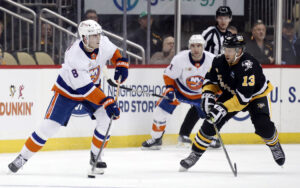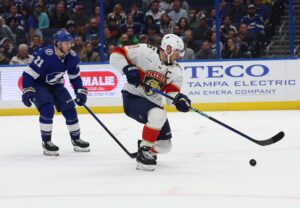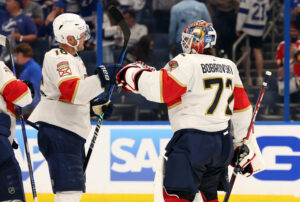We’re on the second piece in our season review of the 2018-19 San Jose Sharks. We covered the team’s overall results in the last piece; we’ll cover the Sharks 2018-19 player review in this one. The upcoming article will cover the coaching and we’ll conclude with a review of management.
San Jose Sharks 2018-19 Player Review
Top Forwards
The Sharks came into the season with almost the entire forward cast of the prior season intact. The lone noteworthy departure was the third-line center, Chris Tierney.
The dynamics changed, but much was reasonably predictable. Tomas Hertl and Timo Meier both topped 30 goals for the first time. Many forecast bright futures for the Sharks elite power forwards and it was evident in 2018-19. Hertl took a big step by moving to centre in mid-season and while this experiment hadn’t worked out in prior attempts, it worked out this time.
Logan Couture and Joe Pavelski delivered solid seasons, though both finished as minus players. Both were physically battered in the playoffs, especially Pavelski. Couture, however, led the entire NHL playoffs with 14 goals despite only playing three rounds. At key times, he carried the team.
Joe Thornton continued to mow down milestones as his return to health sparked the team’s third line. Thornton finished with 51 points. His wingers were the beneficiaries. Kevin Labanc tallied 56 points and Marcus Sorensen had 17 goals, career bests all-around. Labanc found himself a regular on the team’s power play, setting a record with four power-play points during the major penalty late in Game 7 against the Vegas Golden Knights.
Evander Kane was good, but the Sharks need him to be great. A challenge with Kane is his ability to stay healthy over an extended season. His track record of staying healthy into April was sketchy before he came to San Jose. His modest 2018 playoff performance did nothing to put the concerns to rest. Nor did he excel in the playoffs in 2019. He also frequents the penalty box too much and his 153 penalty minutes led the entire league. In part, this is due to his physical play, in larger part due to careless play. In some part, though, it seems like he gets officiated differently than the rest of the Sharks team.
Midseason Forward Additions
Gustav Nyquist was acquired at the trade deadline from the Detroit Red Wings. He has good talent, but it didn’t seem to mesh all that well. He was pushed around too easily and was often out of synch with his talented linemates. In 20 playoff games, he delivered just one goal with 10 assists. Brought in to make a difference in the playoffs, Nyquist qualified as a disappointment.
Micheal Haley was taken off waivers and wound up playing far more than expected, including 11 playoff games. While he did some good things, he is what he is. A fighter with limited hockey skills at the NHL level. He was among the Sharks players who took a beating in the playoffs. He took a massive slash on the wrist in one game and blocked a hard shot with his ankle in another. Both looked like season-ending injuries. As tough as they come, Haley returned after each injury, though he did miss a few games as a result.
Depth Forwards
Dylan Gambrell got a brief audition in the 2017-18 season and an eight-game stint in the 2018-19 regular season. Injuries to others opened the window for him to appear in two playoff games. In the season finale against the St. Louis Blues, Gambrell scored the Sharks only goal of the game, his first as an NHL player.
Other lower line players had mixed seasons. Barclay Goodrow played every game and held down the fourth-line centre spot. He had only 17 points but was strong on the penalty kill. His series-winning goal in overtime of Game 7 against the Vegas Golden Knights will go down as an all-time highlight in an all-time epic game. Melker Karlsson reached a dozen goals, but it seemed like he could contribute more. Importantly, he was too quiet in the playoffs. Joonas Donskoi had 14 goals on the season, though he went from January to May without one before his game-winning goal in the series against the Colorado Avalanche. He made his way into the coach’s doghouse at times.
Powerfully built Czech Lukas Radil, in his first NHL action, played 36 games. He had some promising early games but found himself back in the AHL later in the season. Finnish import Antti Suomela got the initial nod for the Sharks at the beginning of the season, playing in 27 games, but was unable to play effectively and returned to the AHL for the remainder of the season.
Defencemen
The Sharks entered the season with the league’s most expensive, and by expectation, the league’s best blue line. At times, it lived up to the reputation.
Brent Burns had a stellar season, leading all NHL defencemen with 83 points. He was also defensively responsible, at least by his standards, finishing plus-13. He started the season paired with Joakim Ryan, but the Sharks coaches tired of Ryan and gave Radim Simek the chance to take the job opposite Burns.
Simek was excellent and held the starting job until a knee injury ended his season. In all, he played 41 games and finished plus-7. Simek is a physical player, something Ryan wasn’t, and he’d have been ideal for the extremely physical playoffs the Sharks found themselves playing. Ryan returned to the line-up following Simek’s injury, but the coaches never trusted him and Ryan usually found himself benched by mid-game.
Longtime partners Marc-Edouard Vlasic and Justin Braun found themselves separated this season and neither had a particularly good regular season. Vlasic was a minus player for the first time in over a decade, while Braun posted the worst plus-minus on the team, going minus-20 from November 1 through the rest of the season.
Vlasic’s mixed season did turn for the better when an injury allowed Tim Heed to become an every game player. The combination was good, with Vlasic returning to his elite form and Heed finishing a plus-9 in 37 games. Heed was benched for most of the playoff run, but Vlasic’s strong play continued. He, unsurprisingly, led the Sharks with a plus-6 rating in the postseason.
Erik Karlsson’s Season
The major story surrounded Erik Karlsson. His season can be broken into four parts. Part one was his early-season performance. He struggled as he appeared to try to do too much and was on the wrong end of too many odd-man rushes.
Part two began in early December. Changing partners from Vlasic to Brenden Dillon worked wonders. Karlsson’s game took off and he played MVP-level hockey until part three, an injury which felled him in mid-January. Karlsson made a brief return attempt in February, but it was aborted when he re-injured himself.
The fourth part was Karlsson’s playoff return. Far from fully healthy, Karlsson was able to contribute on offense but was a major liability on defense. By the end of the playoffs, Karlsson’s injury was too much and he was unable to play the season finale.
Brenden Dillon was Karlsson’s best partner and posted a team-best and career-best plus-19 rating. Dillon’s strong regular season didn’t carry over to the postseason. In the playoffs, he struggled as partners shifted constantly and his game was less consistent. He finished a shocking minus-8 and was benched for the second half of Game 7 against the Vegas Golden Knights.
The Sharks elite defensive group showed itself at times, but rarely all at once. The combinations of Burns-Simek, Karlsson-Dillon and Vlasic-Heed each looked like an elite pair for considerable stretches. But the time for them to hit stride was the playoffs and only Burns and Vlasic came up large.
Goaltenders
The Sharks goaltending in the regular season was the worst in the league, as measured by save percentage. Some of it is attributable to defensive lapses, especially early in the season where Martin Jones and Aaron Dell were hung out to dry. But much of it was on the two netminders.
Jones again carried a huge workload, playing 62 games. It is tough to explain why. Aaron Dell didn’t prove any better, but he wasn’t any worse. It seemed obvious to give Dell the reins for a while. This provides Dell the chance to do better while giving Jones the chance to reset his game. Sharks head coach Peter DeBoer never made that move.
With both goalies inconsistent, the Sharks entered the playoffs hoping the playoff version of Jones would show. For one game, the playoff opener against the Vegas Golden Knights, it all seemed possible.
But Jones returned to his unfortunate form in Game 2 of the series, lasting just seven minutes and allowing three goals. Dell came in and delivered a solid performance, allowing just two scores the rest of the way. One on a power play, the other on a breakaway.
Jones returned for the next game and the Golden Knights scored six times. In Game 4, Jones lasted just one period, allowing two goals on seven shots. Jones’ critics included former goalies and goaltending experts.
To many, it seemed like Jones was down and out. Dell had saved 17 of 20 in Game 4 but faced 11 power-play shots in the Golden Knights dominant performance. Yet DeBoer showed faith in Jones and a miracle occurred. It is rare to see a goalie turn their game around the way Jones did, but it happened.
Jones was strong in Game 5 and set team records in Game 6 saving 58 of 59 shots. In a game the Sharks were badly outskated, Jones stole the win. While Jones wasn’t as strong in Game 7, the Sharks won the epic game and took the series.
Jones continued to write his redemption story with a strong series against the Avalanche in the second round. His play fell off in the Western Conference Final and his opposite number, Jordan Binnington was the better netminder.
In the end, Jones’ season was less than one would hope, but he did author his own redemption story. Still, the season held a final cruel twist of fate, as a pair of fluke goals, both ‘own goals’ (one off Braun, the other off Nyquist) cost the Sharks a win in Game 4 of the series versus the Blues. Instead of a 3-1 series lead, the fluke scores helped even the series. The Blues rolled the Sharks and Jones in the next two games to move on the Stanley Cup Final, ending San Jose’s season.






